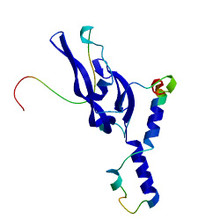 Loading... Please wait...
Loading... Please wait...Categories
Noggin, Human
(Recombinant Human NOG, Noggin)
Purity: >95% by SDS-PAGE and HPLC analyses
Source: Escherichia coli
Noggin belongs to a group of diffusible proteins which bind to ligands of the TGF-β (Transforming Growth Factor) family and regulate their activity by inhibiting their access to signaling receptors. Noggin was originally identified as a BMP4 antagonist whose action is critical for proper formation of the head and other dorsal structures. Noggin has been shown to modulate the activities of other BMPs including BMP2, 7, 13, and 14. Targeted deletion of Noggin in mice results in prenatal death and recessive phenotype displaying a severely malformed skeletal system. Transgenic mice over-expressing Noggin in mature osteoblasts display impaired osteoblastic differentiation, reduced bone formation, and severe osteoporosis.
rHuNoggin General Information
Amino Acid Sequence (165 aa):
MQHYLHIRPA PSDNLPLVDL IEHPDPIFDP KEKDLNETLL RSLLGGHYDP GFMATSPPED RPGGGGGAAG GAEDLAELDQ LLRQRPSGAM PSEIKGLEFS EGLAQGKKQR LSKKLRRKLQ MWLWSQTFCP VLYAWNDLGS RFWPRYVKVG SCFSKRSCSV PEGMVCKPSK SVHLTVLRWR CQRRGGQRCG WIPIQYPIIS ECKCSC
Reconstitution:
The sample should be briefly centrifuged prior to opening to bring the contents to the bottom. Reconstitute in aqueous buffer containing 10mM HAc to a concentration of 0.1-1.0 mg/mL. Reconstituted solutions are stable for up to one week at 2-8°C. Stock solutions should be aliquoted and stored at -80°C. Further dilutions should be made in appropriate buffered solutions..
Storage:
The lyophilized sample is stable at 2-8°C, but should be kept desiccated at -20°C for long term storage. The reconstituted sample can be apportioned into working aliquots and stored -80°C for maximal stability. Avoid repeated freeze/thaw cycles.
Free Shipping within the Continental USA

